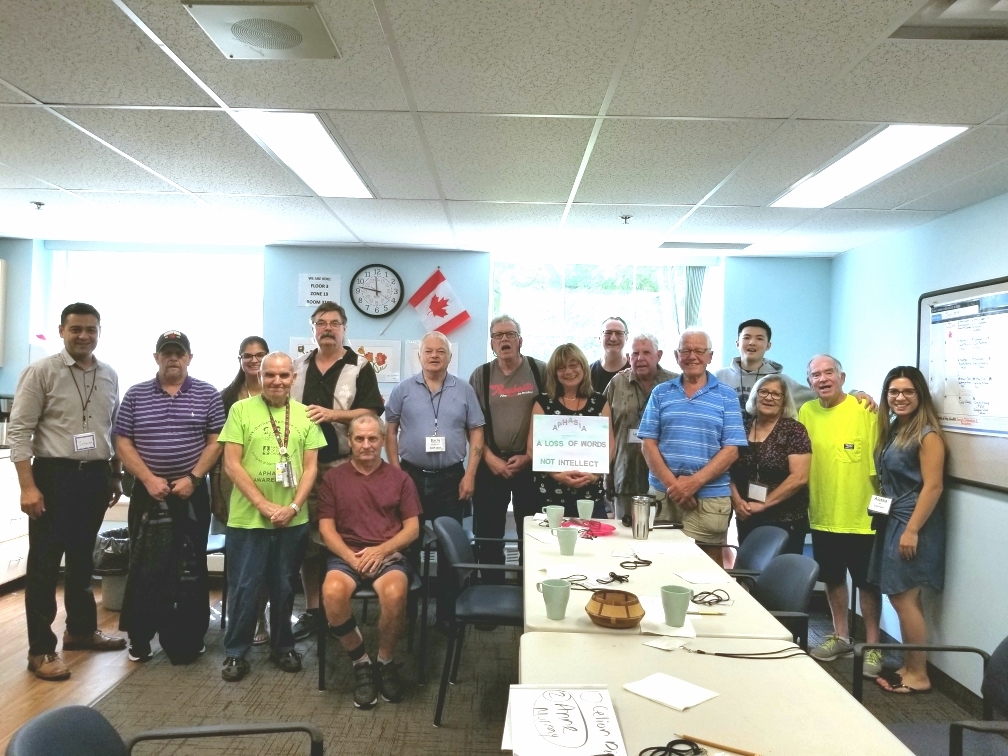While the Aphasia Threads project brings together the stories of people with aphasia, caregivers, and professionals, a group of people with aphasia decided to tackle the questions collectively.
The Aphasia and Communication Disabilities Program at the March of Dimes in Ontario, Canada tackled the questions together as a group. The group meets Friday mornings at Newmarket ACDP.
The Aphasia and Communication Disabilities Program (ACDP), a program of March of Dimes Canada, is a community of people living well with aphasia and other acquired communication disabilities due to stroke, brain injury, or brain illness. They run weekly group communication programs at six sites in southern and central Ontario. As part of their Aphasia Awareness Month activities in June, 2019, the Friday morning group in Newmarket discussed their points-of-view when it comes to living with aphasia. While the majority of group members identified with having had a stroke, one member identified with having aphasia due to a brain illness.

Aphasia Changes Your Life
The group members expressed the following sentiments, more or less in their own words:
- Aphasia impacts everything because communication is in everything
- Frustration so you don’t participate in conversations
- Frustrating for others! They think, “What are you talking about, you fool?!”
- When a miscommunication happens, you assume it’s your fault because of aphasia, but sometimes it’s not your fault!
Some group members expressed that aphasia has impacted their relationships positively, saying “Since I’ve had aphasia, I’m a better man than I was.” Others emphasized, “I don’t feel that it has changed me from who I was before to who I am now.” There were others who brought up ways that aphasia impacted their relationships for the worse – “Everybody else is giving me directions for how to live” or “Sometimes I want to move to the moon—-there are no people out there.” Of course, some people felt that aphasia has affected their relationships in both good and bad ways.
But There Are Things That Help
- Automatic speech practice (e.g. days of the week, months of the year, letters of the alphabet, counting, etc.)
- The card for my wallet that says “I have aphasia”. The card worked.
- An occupational therapist suggested I do word searches to keep myself focused on what I was doing. I start one and I keep at it.
- I kept doing the pages that the SLP sent home with me to practice spelling. My brain would get tired and I knew when I had done enough. You have to lie down and have a rest now.
- I go to the librarian and ask her for books. I started with shorter stories. When I have a book that has small print, it’s really hard for me to keep at it. Maybe the larger print helps.
- Acceptance. That’s the biggest tool. You have a lifelong problem. It’s not just gonna go like that. I’m stubborn. Wife family, dog, doesn’t matter. Life is going to go on every day.
- Telling other people, I can then get my message out. Them knowing that I’m not the way I used to be, just give me time. I relax more and I can get my message out easier. I always remember going to Home Depot and I couldn’t find what I wanted. I went up to the person and told them I have aphasia. They said “It’s OK”, and I thought “Ya, it is OK!”
And Things You Learn Along the Way
- You’ve got to keep working at it every day in order to improve yourself. And be patient. Because it takes quite a while to get over it. (Someone else chimed in, “You never get over it!”)
- I think brain teasers help your aphasia. The brain can change positively, but you’ve got to give it a chance. You’ve got to work it.
- Don’t be embarrassed. Start off good communication. Tell people you have aphasia. It becomes OK. It’s natural.
- You could be someone like me or someone that can get by a little easier than I did. Everyone’s just got to say, “oh well.” It was a year and a half to get here. And it gave me hope in about the last half a year.
- Never give up!
- Keep working means you have to be around other people who know what aphasia is.



